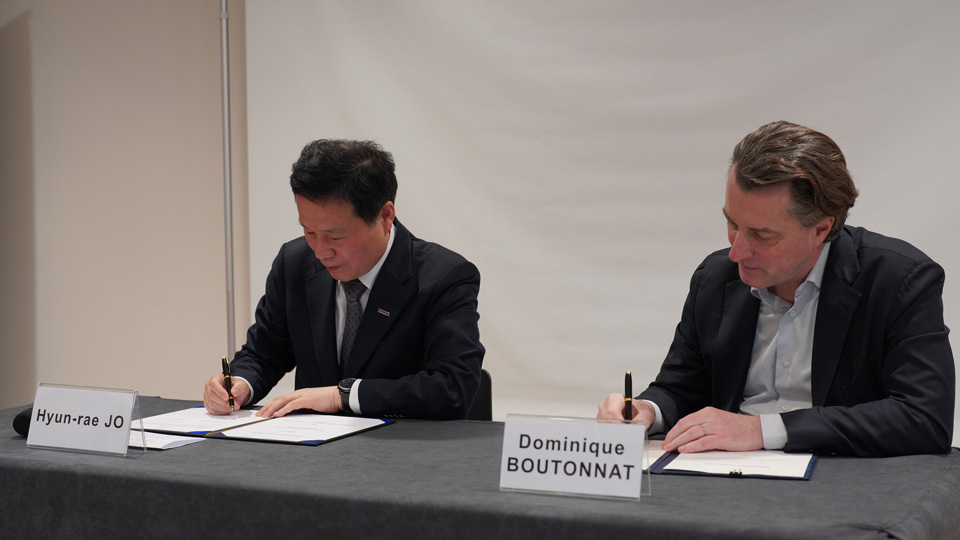The Toulouse Meeting bridged two continents linked by a common passion for culture and a common vision of the fundamental values embodied in cultural diversity, identity as well as in intercultural dialogue. Europe and Latin America share the same ambition for their audiovisual industries. They aim them to flourish, both locally and internationally. The Meeting was the first stage in a dialogue that emerged as both natural and necessary. European and Latin American film agencies understand they will be stronger by working together to promote their values.
Ms Frédérique Bredin, the CNC’s President, declared that “European and Latin American film agencies understand they will be stronger by working together to promote their values.”
This meeting took place in the spirit of the 2005 UNESCO convention on cultural diversity.
Common values and objectives: promoting diversity and adapting to digital challenges
Most Latin American and European countries consider that facilitating the circulation of goods and services is an opportunity for their economic and cultural development. They also agree audiovisual industries should not be considered in the same way as other services. Cinema, television, and new media such as Video on Demand (VoD) platforms are services with the potential to offer a diversity of works and products. However, they require regulatory frameworks from Governments to deliver fair and balanced economic and cultural relations.
Governments have the right, in fact the duty, to ensure the diversity of the offer and widespread access to this environment. Thanks to public intervention, financial means can be dedicated to support creativity and thus the production and the exhibition of works the market alone would not consider valuable. There are also many examples of films made possible by public financing that are commercially successful.
Alongside strong public support, the development of thriving audiovisual industries in Europe and Latin America requires a favourable environment for private investors, one in which the different stakeholders (producers, distributors, TV channels and VoD providers) all share the risk on their investment. The practice of prefinancing that exists in most European and Latin American countries ensures that works produced can access markets to generate returns and become profitable. Thus, the creation of mechanisms which foster coproductions and the generation of revenues, through international sales, are both essential for audiovisual productions, particularly from smaller national markets.
Therefore, both the EFADs and the CACI participants are concerned that the agenda of the European Commission for a Digital Single Market jeopardises the exploitation of works on a territory by territory basis, which puts at risk the production, coproduction and distribution capacities in both continents.
Most coproductions originate in Latin America, where authors and directors offer stories and images which European audiences like. Some of these receive finance from several European funds, a confirmation of their international potential.
The opening of Eurimages to non-European members represents an interesting opportunity for Latin American countries. CACI delegates also welcome the proposed opening of the Council of Europe Convention on cinematographic coproduction to non-member States; furthermore, they suggest exploring the feasibility for a reciprocal arrangement which would open the Ibero-American film coproduction agreement to European countries.
The EFADs and CACI participants also agree on the need for more cooperation and exchange, in particular regarding regulatory frameworks for the audiovisual and VoD market in their different countries. They consider it important to guarantee a level-playing field for all operators involved in the value chain to ensure fair competition in the market, as well as to stimulate economic development and cultural diversity.
In view of the regulatory challenges resulting from the digitisation of movie theatres, both organisations consider it important to promote the principle of diversity. They also stress the need to promote theatres screening a large diversity of works, both national and international. The objective is to avoid homogenisation and to encourage a plural and diverse distribution of films, the prerequisite for true freedom of choice for the audience.
***
Proposals to build a structured partnership
Based on the discussions, three main axes of cooperation have been identified:
- Increasing artistic coproductions and enhancing their distribution
- Launch of jointly funded co-development grants
- Minority coproductions
- Reinforcing the broadcast of European and Euro-Latino films on television
- Building a more structured dialogue
- Observer Status
- A dedicated Working Group on distribution issues
- the involvement of exhibitors, in particular multiplexes, in promoting diversity
- the diversity of films available on VOD services.
- Film literacy
The EFADs and CACI would like to establish regular communication. Each will be represented at the other’s meeting through an observer.
A common CACI/ EFADs working group will be set up to nurture dialogue, exchange best practice and to work on shared recommendations.
The working group will meet annually during the San Sebastian Film Festival to discuss the evolution of both markets. The European Audiovisual observatory and the Ibero-American Audiovisual Observatory would be key partners of this initiative, and their expertise will help the gathering and sharing of statistical data and its analysis.
Amongst topics for discussion, particular attention will be paid to:Delegates agreed that Film literacy is a vital tool to develop audience appreciation of a diverse range of cinema. Given the challenges of the digital environment, the EFADs and CACI will regularly exchange best practice in this area.
- Speaking with one voice on common issues
- Constant vigilance and mobilisation to protect and promote cultural diversity
- ensure the contribution of new players to the financing of creative works;
- broaden the diversity of offer;
- promote the visibility and findability of diverse contents on the net;
- preserve in trade negotiations the right to regulate and support the audiovisual sector through public policy now and in the future (rejection of the standstill clause).
- Joint statements on digital issues
- Reviving Media Mundus
EFADs and CACI underlined how instrumental the MEDIA programme has been to encourage the cross border circulation of works and exchange between professionals.
However, both EFADs and CACI delegates regret that the Media Mundus strand has been ended. It had a very successful record as a powerful and effective instrument to foster cooperation projects between Europe and Latin America.
Both organisations will join forces to advocate in favor of reintroducing this scheme. A common position will be put forward in the framework of the MEDIA programme’s mid-term review.
In order to meet the challenge of preserving cultural diversity in a global digital environment, participants recognised the need to remain vigilant. They also agreed to initiate actions to raise awareness and to mobilise both professionals and governments at national, regional and international levels in the relevant fora.
EFADs and CACI members will endeavour to be systematically involved in defining national positions to ensure the preservation of cultural diversity in trade negotiations.
Participants affirm their commitment to contribute with common positions to the elaboration and adoption of operational guidelines on the implementation of the 2005 UNESCO Convention on the protection and promotion of the diversity of cultural expressions, especially in relation to the new digital environment.
In that respect, they affirm the core principle of technological neutrality of the Convention, which means that the principles enshrined in the convention are relevant regardless of the technological evolution.
They agree to work on concrete proposals in their future meetings, which may include measures to:Delegates share the same concerns with regard to the need to preserve the principle of territoriality of rights. This is at the heart of the financing and distribution models both of independent European and Latin-American works. CACI and EFADs agree to publish joint statements in order to strengthen their position.
Both CACI and EFADs delegates agreed on the need to actively promote co-productions between Europe and Latin America, especially those involving artistic and technical exchange. This is crucial both for the circulation of works and to ensure that these works perform in a global digital environment.
They also agreed that, advancing the international distribution and circulation of these coproductions is a priority. Consequently, they agreed on the necessity to discuss new initiatives to achieve this.
CACI and EFADs delegates are willing to explore the possibility of launching common funding schemes focused on the co-development of films. Awarded to projects intended to become Europe-Latin America co-productions, these grants would encourage collaboration from the earlier stage and increase the number of genuine artistic co-productions. Talent and expertise are shared equally between the two continents: Authors and artistic teams can successfully work together.
There was agreement that official minority Euro-Latino co-productions should be fully entitled to benefit in all respects from the “national treatment”.
It was also agreed that European rules (stated in the AVMS Directive) need clarification to allow official international coproductions involving a non-European majority participation to qualify as a European work.
Inspired by CACI’s successful experience with the IBERMEDIA TV initiative (regular broadcasting of Latin-American films, each week, on public TV channels), EFADs participants would like to initiate discussions with European public broadcasters and the MEDIA programme to find ways to encourage the programming of films from different European countries, including coproductions with Latin America.
> download (PDF)





